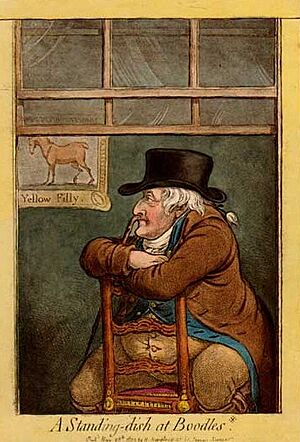Parisot (horse) facts for kids
Quick facts for kids Parisot |
|
|---|---|
| Sire | Sir Peter Teazle |
| Grandsire | Highflyer |
| Dam | Deceit |
| Damsire | Tandem |
| Sex | Mare |
| Foaled | 1793 |
| Country | Kingdom of Great Britain |
| Colour | Brown |
| Breeder | Sir Frank Standish |
| Owner | Sir Frank Standish |
| Trainer | Richard Prince |
| Record | 22: 2-5-7 |
| Major wins | |
| Epsom Oaks (1796) | |
Parisot (born in 1793) was a famous Thoroughbred racehorse. She is best known for winning the important Epsom Oaks race in 1796. Parisot was owned by Sir Frank Standish. He also owned another successful horse, Didelot, who won the Epsom Derby in the same year.
Contents
About Parisot
Parisot was born in 1793. Her father was a horse named Sir Peter Teazle, who had won the Derby race. Her mother was a mare named Deceit, born in 1784. Deceit was also owned by Sir Frank Standish.
Parisot was one of 13 foals born to Deceit. She was the second of eight foals whose father was Sir Peter Teazle. Interestingly, Parisot's mother, Deceit, had a full-sister called the Yellow Filly, who won the Oaks race in 1786. Parisot also had a full-sister, the Sir Peter Mare. This sister later became the grandmother of a Derby winner named Prince Leopold.
Parisot was given her name after a well-known French dancer of that time, Mademoiselle Parisot.
Parisot's Racing Career
Parisot competed in many races during her career. Here's a look at her most important seasons.
1796: Three-Year-Old Season

Parisot had a great year when she was three years old. Her biggest win was The Oaks race. This race took place on Friday, May 13, at Epsom Downs Racecourse. Parisot won against 12 other fillies. She beat a horse called "Sister to Viret" and another filly. The favorite horse in the race, Frisky, was disqualified for running off the track.
After her big win, Parisot raced a few more times that year. At a July race in Newmarket, she lost a special "match race" against a colt named Cub. She also finished third in a £50 race. In October, she came third in the Town Plate race and third again in a £50 Subscription Handicap Plate.
1797: Four-Year-Old Season
When Parisot was four, she continued to race. In April, she competed in the Craven Stakes at Newmarket. She did not place in this race, which was won by a famous horse named Hambletonian.
Later, at Epsom in May, Parisot finished second in a £50 race. In July, at Chelmsford, she came in third in a race called Her Majesty's Plate. She was placed third because she "bolted," meaning she ran off course during the race.
1798: Five-Year-Old Season
In April, Parisot raced in the Oatlands Stakes and finished fourth. She also came third in the King's Plate. In August, she was second in the 100-guinea His Majesty's Plate at Newmarket.
Parisot also raced at Lincoln, where she finished fourth in another His Majesty's Plate race. She finished second in one part of that race. She had two more races that season, finishing second in one and third in another.
1799: Six-Year-Old Season
Parisot raced only three times in 1799, all at Newmarket in April. She won a large 1100-guinea sweepstakes race, beating two other horses. The next day, she finished second in the King's Plate. In her final race of the season, she was sixth in a handicap race.
1800: Seven-Year-Old Season
In April, Parisot finished third in an 800-guinea sweepstakes race. In May, she was fifth in the Jockey Club Plate. Her last recorded race was at Epsom in May, where she finished third in a race that involved three long heats.
Life After Racing
Parisot stopped racing in 1801. She became a "broodmare," which means she had foals. She gave birth to four foals between 1803 and 1808: two colts (male horses) and two fillies (female horses).
One of her fillies, Pirouette, was born in 1807. Pirouette finished second in the 1810 Oaks race, just like her mother. Sadly, Pirouette was one of several horses that became sick and died at Newmarket in 1811. It was believed they were poisoned. Another full-sister to Pirouette also finished second in the 1811 Oaks. Parisot is not recorded as having any more foals after 1808.
Parisot's Family Tree
| Sire Sir Peter Teazle (GB) 1784 |
Highflyer 1774 |
Herod | Tartar |
|---|---|---|---|
| Cypron | |||
| Rachel | Blank | ||
| Regulus Mare | |||
| Papillon 1769 |
Snap | Snip | |
| Sister to Slipby | |||
| Miss Cleveland | Regulus | ||
| Midge | |||
| Dam Deceit (GB) 1784 |
Tandem 1773 |
Syphon | Squirt |
| Patriot Mare | |||
| Regulus Mare | Regulus | ||
| Snip Mare | |||
| Perdita 1769 |
Herod | Tartar | |
| Cypron | |||
| Fair Forester | Sloe | ||
| Forester Mare |
- Parisot's family tree shows that she was "inbred" to two famous horses, Herod and Regulus. This means these horses appear more than once in her pedigree, which is common in Thoroughbred breeding to keep strong bloodlines.

